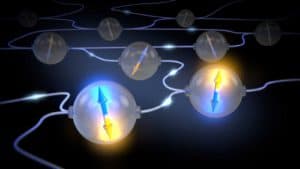
If you’re going to create virtually unbreakable quantum networks, you need to create quantum entanglement so that particles, and thus pieces of data, are intertwined at long distances. There hasn’t been a reliable way to make that happen, however, until now. Scientists at TU Delft have produced the first entanglement on demand — that is, they can reliably trigger the quantum pairing effect and make it last long enough to be meaningful. The effect only worked across two nodes and a modest distance of about 6.6 feet, but it raises the possibility of a quantum internet that’s far more secure than what you see today.
The breakthrough started with a new entanglement method that ensnares particles in diamond chips at 40 times per second — about 1,000 times faster than before. Previous approaches were slow enough to lose the entanglement more quickly than scientists could create it. The team also found a way to shield entanglements from noise, preventing them from degrading as quickly as they have in the past.
There’s a lot of work to be done before there’s honest-to-goodness networking in place. TU Delft can theoretically add a third node and create a true network, but it has yet to reach that point. And if there’s going to be a real quantum internet, distances have to be measured in kilometers and miles. Researcher have already achieved basic entanglement at distances of about 4,200 feet, though, and hope to connect four Dutch cities through entanglement in 2020. This latest development takes them considerably closer to that goal.
This article originally appeared on Engadget.


